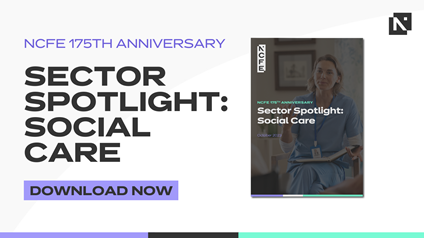Urgent action required: Friday 3 May is the deadline for completing the second term-time checkpoint. Read further guidance.
Why we must act now to safeguard our future workforce
The following content was originally featured in Care Talk in November 2023.
There’s a risk of weakening social care’s talent pipeline unless action is taken quickly, explains David Rowley, Product Manager in Technical Education at the educational charity and awarding organisation NCFE.
Social care is served by an aging and transient workforce, meaning a steady pipeline of talent is crucial to maintaining a pool of skilled staff. It’s essential that we preserve quality training pathways into the sector.
NCFE’s Sector Spotlight on social care, which provided expert insight into current and future challenges, highlighted the pressing need to bring young, skilled workers into the sector.
It’s vital there are clear entry pathways for 16–19-year-olds. Currently, the most common route into the sector is either a Level 2 or 3 technical qualification in health and social care, or a Level 2 or 3 apprenticeship in adult care.
The first route, however, is set to be altered by the Department for Education’s (DfE) post-16 reforms, which will significantly change the landscape of technical qualifications. There’s a real concern that, for a time, students could be left without viable options to pursue a vocational course in social care through a classroom-based route.
In a staggered series of cycles from 2025, all post-16 technical qualifications must now meet new criteria; all others will have funding approval withdrawn.
Only qualifications that are “necessary, high quality, and have a clear purpose” will be approved. We absolutely agree with the application of strict criteria and any measures taken to improve the provision on offer, however we would argue that there’s a strong case for a social care qualification for 16–18-year-olds.
What’s more, a crucial aspect of this is that new qualifications must map to occupational standards, rather than broadly covering whole sectors. The era of technical diplomas in ‘health and social care’ is coming to an end, and the time of qualifications that map to standards, such as adult care, is about to begin.
One qualification that’s been well publicised in the media is the Health T Level, which maps to the senior healthcare support worker standard. This prepares learners for careers as healthcare assistants or for progression onto degree courses, perhaps in nursing or midwifery.
It isn’t, however, an appropriate route into social care. For these learners there will be Level 2 and 3 diplomas in social care, likely mapped to adult care standards. Whilst a qualification isn’t a necessity for entering the workforce, raising the skill bar can only benefit the sector. A Skills for Care report highlighted that care workers with social care qualifications are less likely to leave their roles compared to those without.
We have a future route aimed at ‘health’ and another at ‘social care’, so what’s the problem? The issue lies in the cycles of defunding and approval.
Most large health and social care qualifications will lose funding in August 2024 as they have been deemed to overlap with the Health T Level – even those solely focused on social care such as the Level 3 Diploma in Adult Care. As mentioned above, the cycles of approval are staggered and qualifications specific to care services can only be approved to be taught from September 2026.
This is incredibly problematic as it creates a two-year gap in provision in which it will be impossible to study social care outside of apprenticeships.
The DfE’s own guidance states that during the transition from existing qualifications to reformed or new qualifications, it wants to ensure that changes do not “create gaps or insufficient coverage in provision” – perhaps an unintended consequence in this case.
NCFE is continuing to draw the DfE’s attention to this and urge them to extend funding for adult care qualifications until August 2026. Inaction risks closing off a key route into the sector and further exacerbating the ongoing recruitment crisis.
Find out more about our work in the social care sector by visiting our social care sector specialism page.

Attracting younger workforce key to future of social care
A new report providing expert insight into current and future challenges in social care has highlighted the pressing need to bring young, skilled workers into the sector.

We must seize the opportunity to reimagine the future of the early years sector
Founder of Little Angels Nursery, Lucy Lewin, explains the need to create a collaborative ecosystem where early years professionals can excel and positively impact the lives of children and families.

Why essential skills are crucial in supporting local economies
Our Senior Operations Manager for Learning for Work, Andrew Barton, outlines the importance of essential skills in filling the skills gaps that local regions and economies are experiencing.



